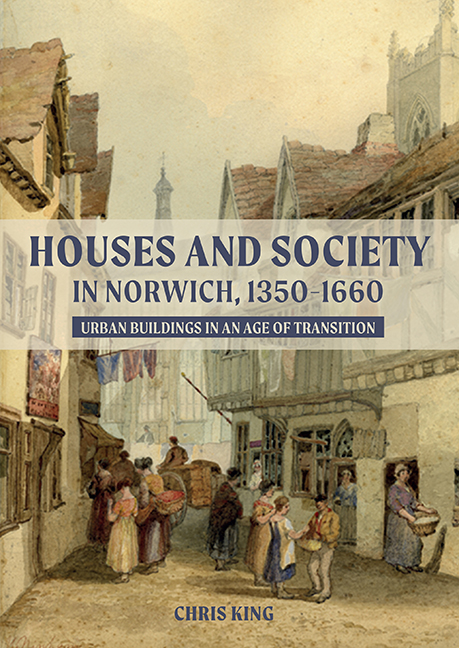Book contents
- Frontmatter
- Dedication
- Contents
- List of plates and figures
- List of tables
- Acknowledgements
- List of Abbreviations
- 1 Urban rebuildings, urban transitions
- 2 Norwich, 1350–1660: continuity and change in an English provincial city
- 3 Medieval merchants’ houses, c.1350–1540
- 4 Early modern merchants’ houses, c.1540–1660
- 5 The urban elite: domestic space, social identity and civic authority
- 6 Medieval houses and the urban ‘great rebuilding’
- 7 Houses of the ‘middling sort’: buildings and the use of space
- 8 Housing the urban poor and immigrant communities
- Conclusions
- Glossary
- Bibliography
- Index
- Plate Section
2 - Norwich, 1350–1660: continuity and change in an English provincial city
Published online by Cambridge University Press: 23 October 2020
- Frontmatter
- Dedication
- Contents
- List of plates and figures
- List of tables
- Acknowledgements
- List of Abbreviations
- 1 Urban rebuildings, urban transitions
- 2 Norwich, 1350–1660: continuity and change in an English provincial city
- 3 Medieval merchants’ houses, c.1350–1540
- 4 Early modern merchants’ houses, c.1540–1660
- 5 The urban elite: domestic space, social identity and civic authority
- 6 Medieval houses and the urban ‘great rebuilding’
- 7 Houses of the ‘middling sort’: buildings and the use of space
- 8 Housing the urban poor and immigrant communities
- Conclusions
- Glossary
- Bibliography
- Index
- Plate Section
Summary
NORWICH was consistently the largest and wealthiest provincial capital in England in the late medieval and early modern era, second only to London according to every major population and taxation listing between the late fourteenth century and the mid-eighteenth century, when its position was finally overtaken by the growth of Bristol and the Atlantic ports (Slack 2000). It stood at the heart of a prosperous and densely populated agricultural region and was an important centre for textile production, particularly the flourishing worsted industry. The trade networks of the city's wealthy merchants extended across East Anglia and the east coast, down to London and across the North Sea to the Low Countries. It was a diocesan seat and royal administrative centre, and a vibrant social, commercial, religious and cultural hub. Norwich is therefore an ideal place to explore the transformative experience of English towns in the transition between the medieval and early modern worlds. The forces described in Chapter 1, encompassing both long-term restructuring and short-term crises – population expansion and mortality, economic growth and polarisation, the realignment of social hierarchies and the revolutionary impact of religious and political conflict – were felt here with particular intensity. Norwich also demonstrates the vital significance of urban institutions and social structures as mediating forces; people experienced dramatic social and economic change within the familiar contexts of the corporation, guild, parish and household, and through the transformation of these communities, networks and traditions they negotiated a path through the turmoil of the age of transition.
Unsurprisingly, Norwich has long been an important focus for urban historians. The corporation itself maintained an impressive series of historical records from the fifteenth century, revealing a heightened sense of corporate identity and memory (McClendon 1999, 14–17). Several antiquaries were active in the city in the first half of the eighteenth century, notably John Kirkpatrick, whose notes, edited by William Hudson, were published in the nineteenth century (Kirkpatrick 1845; 1889), and Francis Blomefield, whose multi-volume survey of the topography and history of the city and county was published posthumously in 1806. Nineteenth-century scholars made a significant contribution to a fuller understanding of the political history of the city, particularly Hudson and Tingey's (1906–10) publication of the selected records of the corporation.
- Type
- Chapter
- Information
- Houses and Society in Norwich, 1350–1660Urban Buildings in an Age of Transition, pp. 37 - 58Publisher: Boydell & BrewerPrint publication year: 2020



